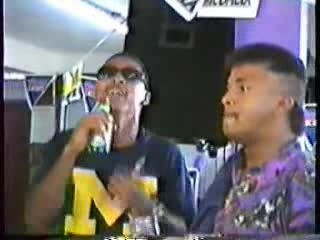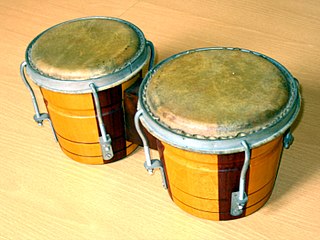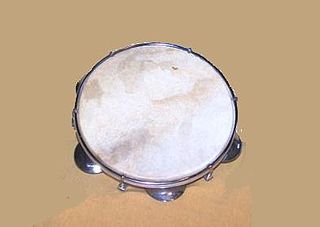Related Research Articles

Salsa music is a popular dance music genre that initially arose in New York City during the 1960s. Salsa is the product of various Cuban musical genres including the Afro-Cuban son montuno, guaracha, cha cha chá, mambo, and Puerto Rican plena and bomba. Latin jazz has had a significant influence on salsa arrangers, piano guajeos, and instrumental soloists.

The güiro is a Latin American percussion instrument consisting of an open-ended, hollow gourd with parallel notches cut in one side. It is played by rubbing a stick or tines along the notches to produce a ratchet sound.

The music of Puerto Rico has evolved as a heterogeneous and dynamic product of diverse cultural resources. The most conspicuous musical sources have been Spain and West Africa, although many aspects of Puerto Rican music reflect origins elsewhere in Europe and the Caribbean. Puerto Rican music culture today comprises a wide and rich variety of genres, ranging from essentially indigenous genres like bomba to recent hybrids like Latin trap and reggaeton. Broadly conceived, the realm of "Puerto Rican music" should naturally comprise the music culture of the millions of people of Puerto Rican descent who have lived in the United States, and especially in New York City. Their music, from salsa to the boleros of Rafael Hernández, cannot be separated from the music culture of Puerto Rico itself.
A hand drum is any type of drum that is typically played with the bare hand rather than a stick, mallet, hammer, or other type of beater.

Reggaeton, also known as reggaetón and reguetón, is a music style that originated in Puerto Rico during the mid-1990s. It has evolved from dancehall and has been influenced by American hip hop, Latin American, and Caribbean music. Vocals include rapping and singing, typically in Spanish.

Bongos are an Afro-Cuban percussion instrument consisting of a pair of small open bottomed drums of different sizes. In Spanish the larger drum is called the hembra (female) and the smaller the macho (male). Together with the conga or tumbadora, and to a lesser extent the batá drum, bongos are the most widespread Cuban hand drums, being commonly played in genres such as son cubano, salsa and Afro-Cuban jazz. A bongo drummer is known as a bongosero.
The music of the Canary Islands reflects its cultural heritage. The islands used to be inhabited by the Guanches which are related to Berbers; they mixed with Spaniards, who live on the islands now. A variant of Jota is popular, as is Latin music, which has left its mark in the form of the timple guitar. There has been a strong connection with Cuban music, Venezuelan, Puerto Rican, and other Caribbean countries both through commerce and migration.

La plena is a genre of music and dance native to Puerto Rico.

Bomba is both a traditional dance and musical style of Puerto Rico. Its origins are rooted in the island's history of African slavery but today has evolved into a community expression of Puerto Rican culture. While Bomba can be used as the generic name for a number of rhythms, it is truly about a creative, interactive relationship between dancers, percussionists and singers. Today it's practiced as a communal activity in its centers of origin in Loíza, Santurce, Mayagüez and Ponce. Also, Puerto Rican migrants have brought the tradition to some parts of the US mainland.

The pandeiro is a type of hand frame drum popular in Brazil to the point that it has been described as the unofficial instrument of that nation, and is mentioned in the song, "Aquarela do Brasil". The pandeiro is used in a number of Brazilian music forms, such as samba, choro, coco, and capoeira music. The Brazilian pandeiro derives from the pandeireta or pandereta of Spain and Portugal.
The term requinto is used in both Spanish and Portuguese to mean a smaller, higher-pitched version of another instrument. Thus, there are requinto guitars, drums, and several wind instruments.
Luis Palés Matos was a Puerto Rican poet who is credited with creating the poetry genre known as Afro-Antillano. He is also credited with writing the screenplay for the "Romance Tropical", the first Puerto Rican film with sound.

Afro–Puerto Ricans are Puerto Ricans who are of predominant or partial African descent. The history of Puerto Ricans of African descent begins with free African men, known as libertos, who accompanied the Spanish Conquistadors in the invasion of the island. The Spaniards enslaved the Taínos, many of whom died as a result of new infectious diseases and the Spaniards' oppressive colonization efforts. Spain's royal government needed laborers and began to rely on slavery to staff their mining and fort-building operations. The Crown authorized importing enslaved West Africans. As a result, the majority of the African peoples who entered Puerto Rico were part of the forced migration of the Atlantic slave trade, and came from many different cultures and peoples of the African continent.

Miguel Zenón is a Puerto Rican alto saxophonist, composer, band leader, music producer, and educator. He is a multiple Grammy Award nominee, and the recipient of a Guggenheim Fellowship and a MacArthur Fellowship. Zenón has released many albums as a band leader and appeared on over 70 recordings as a sideman.
"Oye Como Va" is a 1962 cha-cha-chá by Tito Puente, originally released on El Rey Bravo. The song achieved worldwide popularity in 1970, when it was recorded by Mexican-American rock group Santana for their album Abraxas. This version was released as a single in 1971, reaching number 13 on the Billboard Hot 100, number 11 on the Billboard Easy Listening survey, and number 32 on the R&B chart. The block chord ostinato pattern that repeats throughout the song was most likely borrowed by Puente from Cachao's 1957 mambo "Chanchullo", which was recorded by Puente in 1959.

MTV Unplugged is the name of the first live album by Puerto Rican singer Ricky Martin. It was released to the market in CD and DVD formats by Sony BMG Norte on November 7, 2006. It has sold more than 2 million copies worldwide and has been certified with several platinum and gold discs.
Viento de Agua is a contemporary bomba and plena band, created in New York City in 1997. Bomba and plena are musical genres within the Afro Puerto Rican tradition. Their first album, De Puerto Rico al Mundo, was selected among the Top 10 Latin albums of the year by The New York Times.

"Pégate" is the second single from Ricky Martin's first live album, MTV Unplugged (2006). It was released on December 19, 2006. The song was written by Martin, Roy Tavaré and Tommy Torres, and produced by Torres.

Ernesto Antonio "Tito" Puente, Jr. was an American musician, songwriter, record producer and bandleader. The son of Ernest and Felicia Puente, native Puerto Ricans living in New York City's Spanish Harlem, Puente is often credited as "The Musical Pope", "El Rey de los Timbales" and "The King of Latin Music". He is best known for dance-oriented mambo and Latin jazz compositions that endured over a 50-year career. He and his music appear in many films such as The Mambo Kings and Fernando Trueba's Calle 54. He guest-starred on several television shows, including Sesame Street and The Simpsons two-part episode "Who Shot Mr. Burns?". His most famous song is "Oye Como Va".
Alternative reggaeton is a subgenre of reggaeton that emerged from the hip hop movement as a reaction to its repetitive and monotone dembow rhythm, and the predominant stereotypical gangsta content that became predictable. The result was a complex sound derived from world sounds, mainly rooted in Latin American folk music such as Puerto Rican bomba y plena, salsa and tango and also other foreign influenced music such as rock en español. Mixed with thoughtful lyricism guided by an anti-colonialism discourse, Latin American sociopolitical content and racial pride, it gave listeners a smooth blend of danceable rhythms and intellectual dialogue.
References
- Beck, John (1994). Encyclopedia of Percussion. Garland. ISBN 978-0-8240-4788-7.
- ↑ Matos, Tito. LP Percussion Presents: La Plena with Tito Matos. https://www.youtube.com/watch?v=Q6Rk46KJRr0